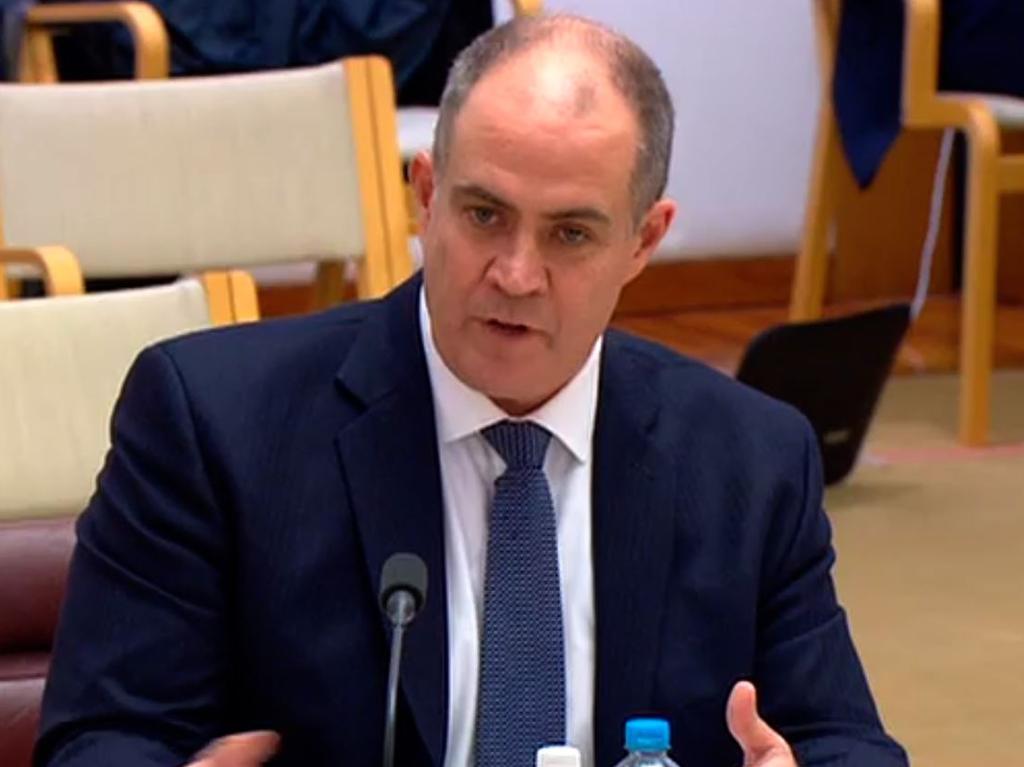
That concession, which will come as no surprise to certain defamation lawyers, confirms what readers of this column learned last Friday: Anderson was less than accurate in March when he repeatedly told the Senate the ABC was indeed bound by the model litigant rules.
The reality, which he now accepts, was outlined in this space last week. The national broadcaster has been exempted from the rules and is free to choose whether to abide by the standards that govern the way other federal agencies conduct themselves in court.
At Tuesday’s estimates hearing Anderson was asked about the ABC’s conduct during one of the defamation cases involving reporter Louise Milligan. Was he confident the corporation had upheld its obligations under the model litigation rules “in the fashion that you described to this committee on March 23”?
Anderson then provided what he said was a point of clarification.
“The ABC chooses to align as a model litigant with those obligations. We are not bound by them. But yes, we do act like a model litigant,” he said.
That means there are no consequences if the ABC is found to have engaged in conduct that would be a clear breach of the rules.
That could, for example, include drawing on taxpayers’ funds to drag out a case in order to exhaust the financial resources of an opponent, refusing to apologise when it knows it is in the wrong or failing to keep litigation costs to a minimum.
Now consider what happened when the national broadcaster provided a financial indemnity for Louise Milligan, star reporter, and took control of her hopeless defamation dispute with Liberal MP Andrew Laming.
Instead of apologising in May, like other parts of the media that had mistakenly defamed Laming, this case dragged on until August when it was settled in Laming’s favour – and at a cost to the ABC that, on Anderson’s estimate, is $184,000 and rising.
According to the Australian National Audit Office, “the total liability of the journalist, which will be met by the ABC, will be in the vicinity of $200,000”.
But even that could be a dramatic understatement of the true extent of the liability incurred because of the ABC’s decision to indemnify Milligan.
At Tuesday’s estimates hearing, the ABC’s chief financial officer Melanie Kleyn said the corporation was seeking legal advice because “there is potential” that the indemnity might incur fringe benefits tax.
The Liberal Party’s Eric Abetz described the indemnity as “a bonus, if you like, by any other name, of some $200,000 with a very real potential of a fringe benefits tax component” that could very well double the financial exposure of taxpayers to $400,000.
The lesson from the national broadcaster’s decision to involve itself in Milligan’s private legal dispute is clear: the ABC needs to be brought into line with the litigation standards that apply to other federal agencies.
The first step means ending the organisation’s exemption from the model litigant rules – which should be uncontroversial now that Anderson has asserted that the ABC voluntarily accepts those standards.
But without proper enforcement, the model litigant rules are an inadequate solution.
When the Productivity Commission was examining this issue in 2014, it was told by the Law Council that allegations of breaches of the rules were not being effectively policed and reviewed. Even among those agencies that were bound by the model litigant rules, compliance was patchy and relied on a system of self-reporting.
The Australian Lawyers Alliance argued that there was no significant penalty for breaches. And even when breaches were investigated and reported, that all happened after the event.
The Productivity Commission’s analysis is outlined in the first volume of its 2014 report on Access to Justice Arrangements. Recommendation 12.3 says:
“Compliance should be monitored and enforced, including by establishing a formal avenue of complaint to government ombudsmen for parties who consider model litigant obligations have not been met.”
After witnessing the way the ABC conducted itself in the Milligan litigation, the time has come to revisit this issue.
And a good starting point is a 2017 bill that might have prevented the ABC from conducting itself like some sort of government-backed litigation funder – had the bill not been allowed to lapse.
The Judiciary Amendment (Commonwealth Model Litigant Obligations) Bill would have empowered the Commonwealth Ombudsman to investigate complaints that federal government litigants had failed to adhere to the model litigant rules.
This bill, unsurprisingly, faced opposition from the federal bureaucracy which would have been subjected to an effective system of accountability for its conduct in court.
This bill, which had been introduced by former senator David Leyonhjelm, would have empowered a court to stay proceedings while the Ombudsman considered a complaint.
If a court were satisfied that a Commonwealth litigant had breached, or was likely to breach, the model litigant rules, the court would have been empowered to make any order it considered appropriate.
The strength of this approach is that enforcement would not be politicised. Ordinary people who found themselves in legal disputes with government agencies would have a way of ensuring the financial clout of the Commonwealth could not be abused by bureaucrats.
As an aspiring model litigant, this approach should be welcomed by the ABC.
Chris Merritt is vice-president of the Rule of Law Institute of Australia.






It took seven months and two sessions of questioning at Senate estimates hearings, but ABC managing director David Anderson has finally accepted reality. He recognised this week that the national broadcaster is not required to be a model litigant.